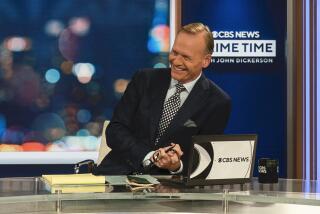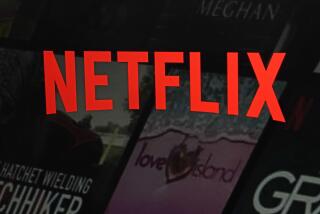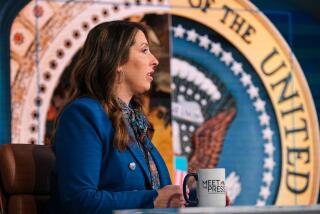Networks’ war strategy: Enlist armies of experts
NEW YORK — Last time they fought the war. This time, they’ll talk about it, around the clock, if necessary.
When the TV anchors take to the airwaves at the start of the now-likely war with Iraq, at their sides will be small armies of generals, academics and think-tank professionals hired to augment the information coming in from news correspondents.
Since the Gulf War 11 years ago, the competition in TV news, fueled by the presence of several cable news channels, has created a booming marketplace for ex-military officials as networks try to gain exclusive use of the best “talking heads” to make sense out of the military maneuvers.
The generals and other military and terrorism experts will play a unique role in TV’s round-the-clock coverage of the war. Part experts and part reporters, they’re marketing tools, as well.
NBC has given five of its top generals their own promotional spot; an ABC executive calls its military experts members of the “team” that viewers can come to trust.
For an average going rate for the top analysts that one TV executive estimated at $5,000 a month, the experts agree to be on call, at any hour, to explain why the U.S. military is doing what it’s doing.
With 24-hour days of airtime to fill, on cable and also initially on the broadcast networks, some news organizations have assigned the generals and other analysts to shifts, so they won’t be left pundit-less at any time.
Many of the key architects of 1991’s Persian Gulf War will have high TV visibility in the coming days. Among NBC’s nearly three dozen analysts are retired Gen. Norman Schwarzkopf, commander in chief, U.S. Central Command, and commander of operations of Desert Shield and Desert Storm; and Gen. Barry McCaffrey, former drug czar in President Clinton’s Cabinet, who served as commander of the 24th Mechanized Infantry Division during Operation Desert Storm.
ABC’s Gen. Richard Hawley and Gen. Charles Horner played key Air Force roles in 1991, as did Col. John Warden, who has been signed up as an analyst for PBS’ “NewsHour With Jim Lehrer” and CNN’s Maj. Gen. Don Shepperd.
Some of the most-sought-after experts are those who have just left the service, bringing with them the most current information.
ABC’s Lt. Gen. Gregory S. Newbold, retired from the Marine Corps, served as the director of operations for the Joint Chiefs of Staff until November.
Gen. William “Buck” Kernan, former Supreme Allied Commander of NATO, joined CBS’ analyst ranks in January, after stepping down as commander in chief of the U.S. Joint Forces Command.
For the moment, the generals look like any of the other numerous button-down executive experts on air. As recently as Monday’s heavy coverage of the prewar endgame, they sat in the usual position to the side of the main anchors, answering questions and offering insights. The generals, in particular, provide an air of insider authority.
Once a war starts, though, some are expected to go back to the military strategizing mode they know so well, tapping into the networks’ whiz-bang computerized maps and 3-D models of planes and weapons.
That was a role a number of military analysts played during the Gulf War in 1991, the first war that had a 24-hour-a-day news channel that could give ample time to analysts’ comments.
The generals are much more than talking heads, however. When a tip comes in, some of the ex-military men will get on the phone -- in private, out of the open-desk chaos of a standard newsroom -- to chase it down, calling sources, oftentimes old buddies, whom even the most-plugged in correspondents can’t reach.
“They’re part of a family that you never fully leave,” said Al Ortiz, CBS News’ executive in charge of special events coverage. “They talk a shorthand to each other, they are able to confide in and trust each other, more easily than they do reporters. And they can reach people our correspondents wouldn’t talk to.”
The experts also act as behind-the-scenes advisors. Newbold traveled with ABC’s Peter Jennings last week on his reporting trip to Kuwait and Qatar; ABC’s Anthony Cordesman, an academic who specializes in military strategy, sends ABC’s war coverage team daily e-mails with information on war strategy and regional issues. Many of the top generals also deliver briefings for network staffers.
McCaffrey, a frequent presence on NBC, as well as on the network’s MSNBC and CNBC and even its local stations, said he hired a researcher just to help with the workload. “If they ask me to do something, I’ll try to do it,” he said.
The networks decline to discuss what they pay their well-worked experts, some of whom are compensated by monthly retainers and others by the day. Paying for guests, particularly guests with a distinct point of view, is controversial, but necessary, say executives.
“We’re asking a lot of them,” said Ortiz. “We get them out of meetings, out of bed, in from the yard. They’re checking out a lot of information for us, running down leads. They spent a lifetime building contacts and expertise, and it’s fair to compensate them.”
The intense competition also has changed the game. “The system is feeding itself,” said Amy Entelis, in charge of hiring for ABC News. So many experts have been signed by the competition, that “you do get concerned ... you’ll be left with the people who might not be your first or second choice. So to get the person you want, you need to tie them up exclusively.”
Hiring just a few people, she said, also helps build a sense that they are part of the reporting team, instead of “nameless, faceless people.”
In addition to the pay, the experts are getting something just as valuable -- exposure for their consulting firms or universities. Elena Nachmanoff, vice president of talent development at NBC, said the network makes its pitch to future consultants based on the various audiences that they can reach: business leaders on CNBC, Washington newsmakers, younger audiences on MSNBC.com.
Gen. Wesley Clark, CNN’s lead military expert and a retired, former NATO Supreme Allied Commander and commander in chief of the U.S. European Command, is getting valuable exposure for his possible run for the presidency. (CNN said it will end his consultancy for the network if he declares his candidacy.)
Some networks have drawn the ire of their experts in the past by signing up too many experts, keeping them in studios for hours on end, and then never putting them on the air.
And some ex-military officers have declined the posts because of their inside knowledge.
“A number of people we have spoken to and tried to put on retainer have said no,” said Dan Sagalyn, who produces “The NewsHour” segments on defense issues. “They know too much and are uncomfortable.”
McCaffrey said he was approached by several networks when he stepped down in 2001 and signed with NBC because he liked anchors Tom Brokaw and Brian Williams.
He likes the job, he said, because it lets him “maintain influence on policy, being able to speak to these issues.”
His role, as he sees it, is to “give balanced viewpoints that reflect prudent good thinking,” and to “explain a process I’ve worked in for most of my life.”
Not all his former military colleagues understand.
“In my age group, there is enormous anxiety about former military figures dealing with the media,” he said, reflecting a history of tensions between the two institutions.
As for the money, he said, it’s beside the point.
“This is a chance be part of a first-class organization, to explain what’s happening to the American people, with enormous latitude to do so using a lifetime of experience and objectivity. I don’t have to clear my remarks with anybody. It’s an extremely useful part of democracy and I’m glad to be part of it.”
More to Read
The biggest entertainment stories
Get our big stories about Hollywood, film, television, music, arts, culture and more right in your inbox as soon as they publish.
You may occasionally receive promotional content from the Los Angeles Times.










